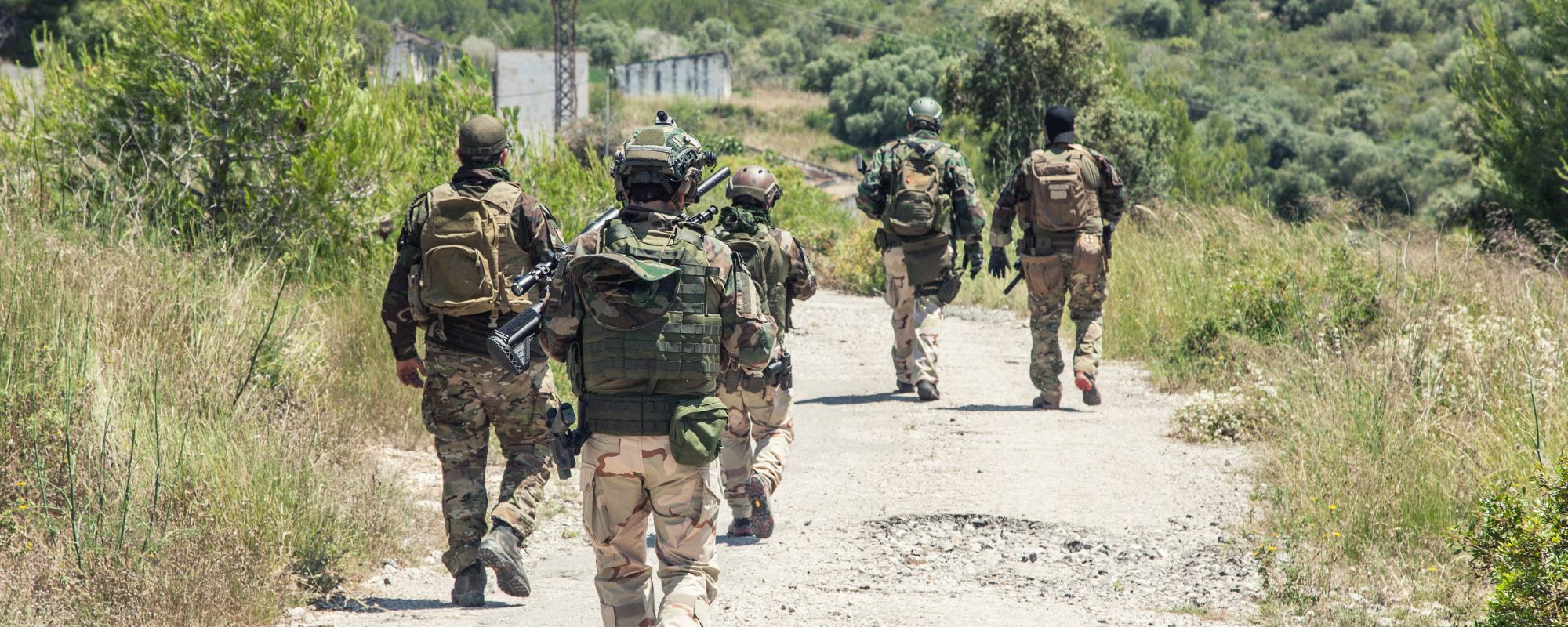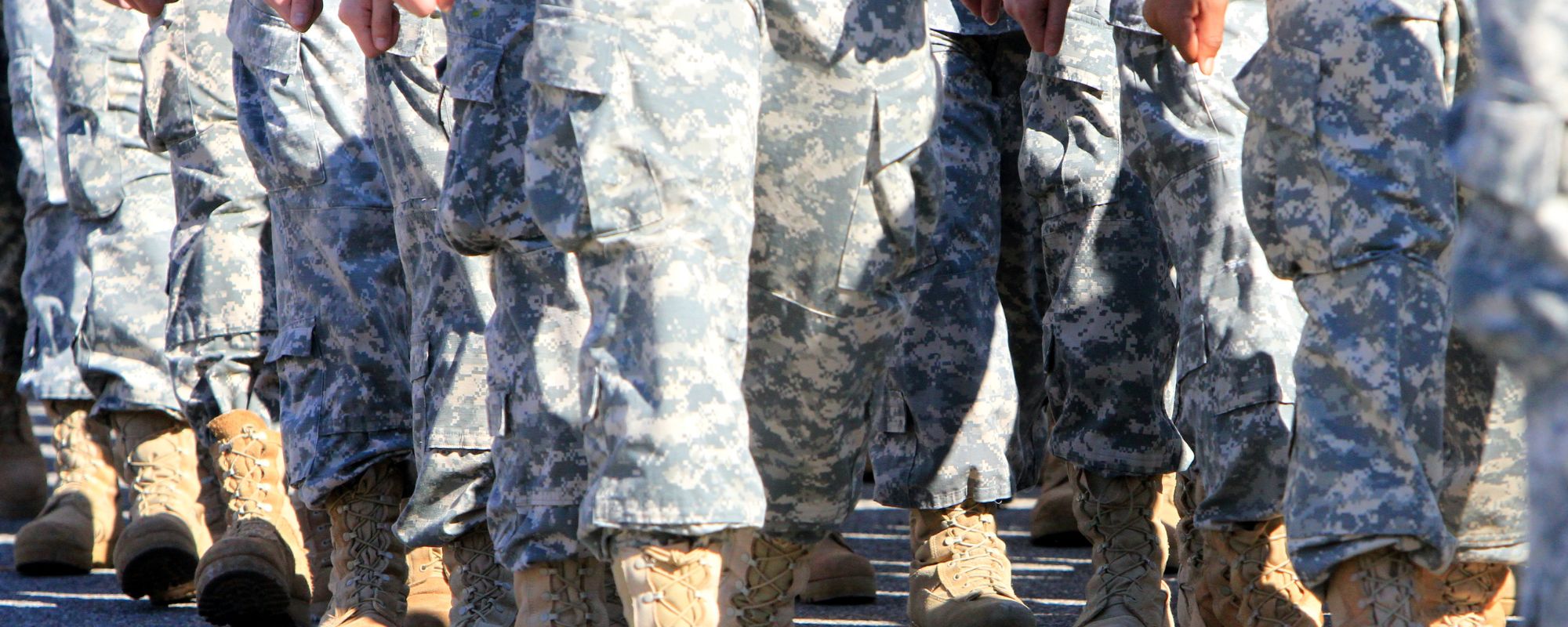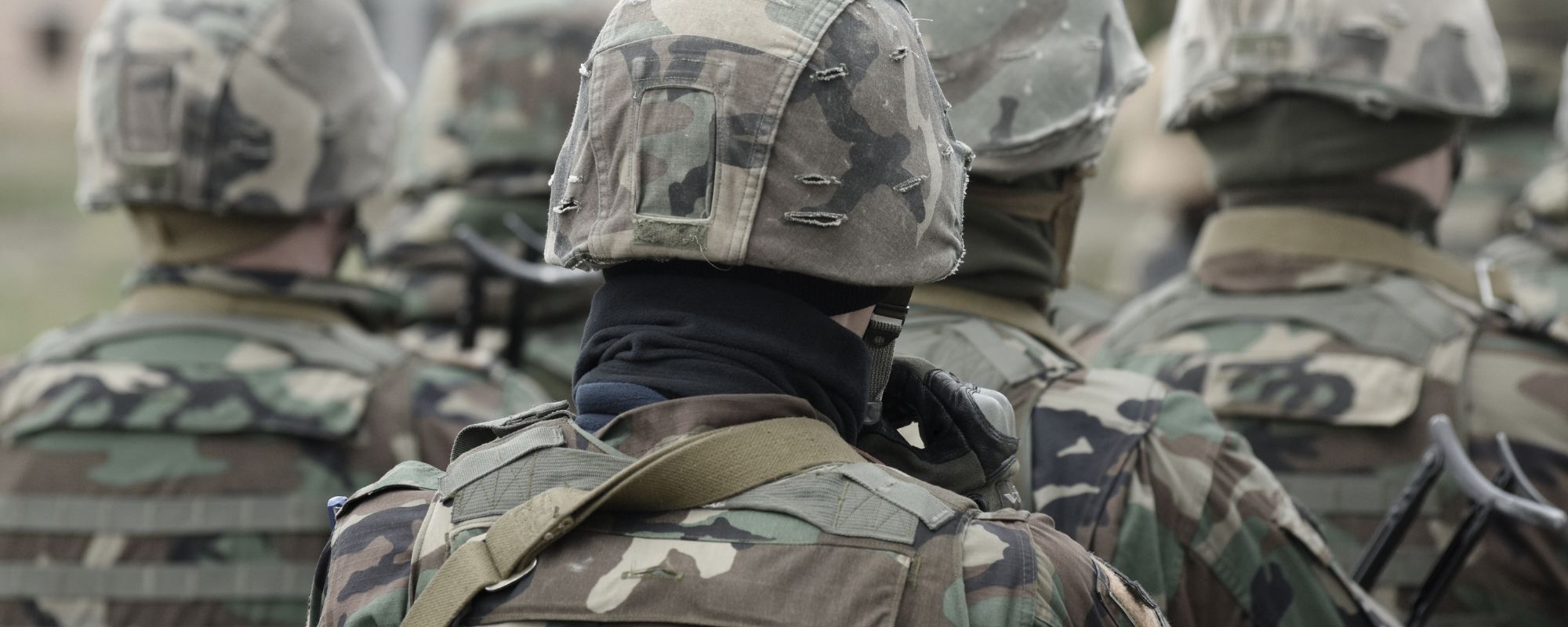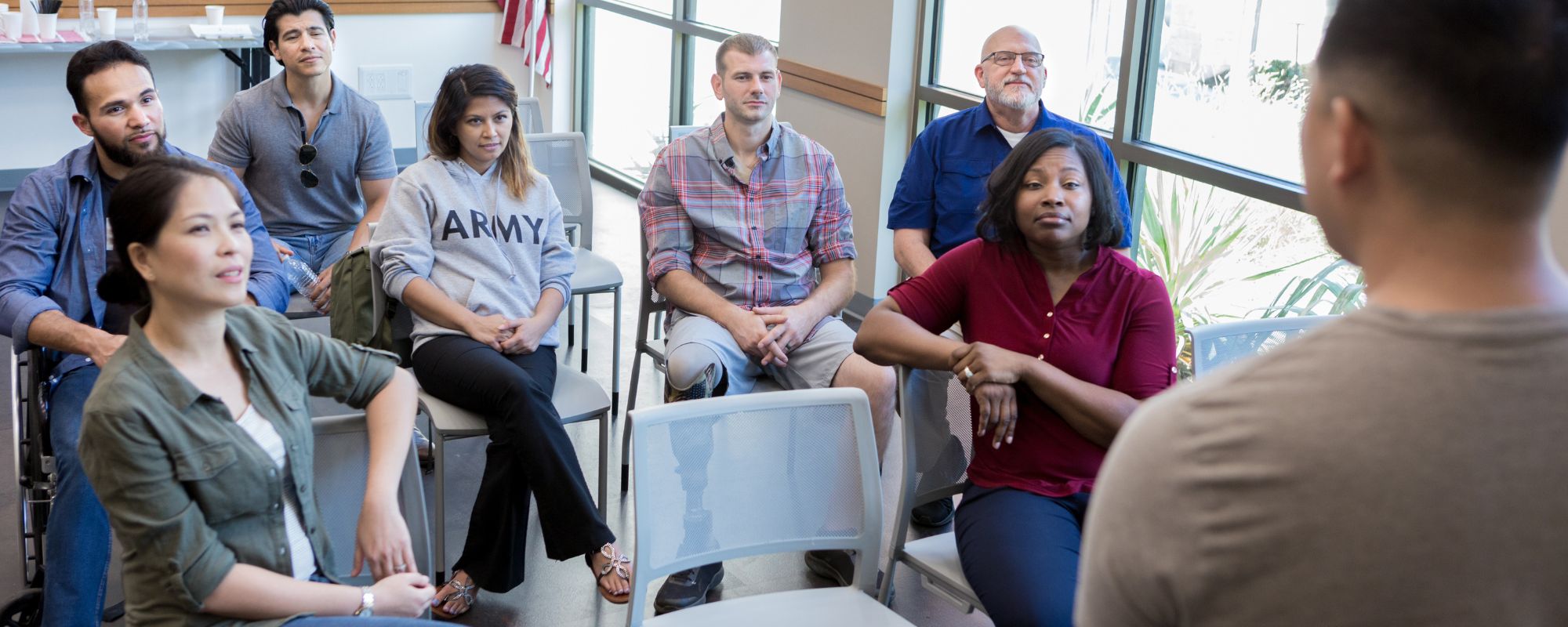Key Takeaways:
-
Combat trauma goes beyond physical injuries—wartime stress, witnessing casualties, and repeated trauma often lead to PTSD, moral injury, and psychological distress that deeply affect veterans’ daily lives.
-
Combat Trauma Management is a specialized, multifaceted approach combining trauma-focused therapies (like CPT, PE, and EMDR), medication, psychoeducation, peer support, and holistic practices to help veterans process traumatic experiences.
-
Addressing co-occurring conditions is essential—treatment integrates care for PTSD alongside substance use, traumatic brain injury (TBI), depression, and other related disorders while also offering family support and social reintegration.
-
Early recognition and compassionate care improve outcomes, and connecting with professional resources—VA programs, crisis lines, and trauma-informed treatment centers—reduces stigma and supports lasting recovery.
Question:
What is combat trauma and who offers therapy for veterans?
Answer:
Psychological injuries from military service—often invisible yet profoundly debilitating—impact countless veterans. Combat exposure involves life-threatening situations, witnessing death, and prolonged stress that frequently lead to post-traumatic stress disorder (PTSD), anxiety, moral injury, and other mental health challenges. These invisible wounds can disrupt emotions, relationships, and daily functioning, and often coexist with conditions like traumatic brain injury (TBI) and substance use disorders.
Combat Trauma Management is described as a comprehensive strategy tailored for those who have served. It brings together evidence-based trauma-focused therapies such as Cognitive Processing Therapy (CPT), Prolonged Exposure (PE), and Eye Movement Desensitization and Reprocessing (EMDR), with medication management, psychoeducation, and peer support groups to create a holistic healing environment.
The psychological wounds sustained during military service often run deeper than physical injuries, presenting as complex and lasting distress. These invisible scars—commonly referred to as combat stress or operational stress, affect countless active duty personnel, veterans, and war veterans across different conflicts, from World War II and the Vietnam Wars to Iraq and Afghanistan. Effectively managing these stress reactions through combat trauma management is essential for restoring veterans’ health and supporting long-term recovery.
Understanding the Impact of Combat Trauma
Military service, especially on the front lines, exposes individuals to a variety of types of trauma. Exposure to life-threatening situations, witnessing casualties, and enduring prolonged periods of intense stress can trigger psychological trauma, often manifesting as post-traumatic stress disorder (PTSD). This condition is recognized by the American Psychiatric Association and classified in the Diagnostic and Statistical Manual of Mental Disorders (DSM), which guides clinical psychology diagnosis and treatment.
Common symptoms associated with combat stress and PTSD include flashbacks, anxiety disorder, hypervigilance, and emotional numbness. Many military and veteran populations—whether National Guard members, women veterans, or combat veterans from the Gulf War, Vietnam, or more recent conflicts—experience these psychological reactions, which can severely disrupt daily life. In some cases, traumatic brain injury (TBI) or moral injury compounds these challenges, increasing the risk of mental disorders and psychological distress.
What Is Combat Trauma Management?
Combat Trauma Management refers to a specialized approach to Post-Traumatic Stress Disorder (PTSD) treatment designed for military personnel and veterans who have experienced trauma during combat or military service. It integrates psychological, medical, and holistic methods to help individuals process traumatic experiences and regain control over their mental health while undergoing PTSD and substance abuse treatment for veterans and first responders.
Key Components of Combat Trauma Management in PTSD Treatment:
-
Trauma-Focused Psychotherapy
-
Approaches like Cognitive Processing Therapy (CPT), Prolonged Exposure Therapy (PE), and Eye Movement Desensitization and Reprocessing (EMDR) help individuals reframe and reduce the impact of traumatic memories.
-
These therapies target the root of PTSD symptoms caused by combat exposure, such as witnessing death, injury, or engaging in life-threatening missions.
-
-
Medication Management
-
Antidepressants, particularly SSRIs like sertraline or paroxetine, may be prescribed to alleviate symptoms like anxiety, hypervigilance, or depression.
-
Other medications may be used to manage sleep disturbances, nightmares, or co-occurring conditionslike substance use.
-
-
Psychoeducation
-
Veterans and service members are educated about PTSD symptoms, the impact of combat trauma, and how the brain responds to prolonged stress and fear.
-
This helps normalize their experience and reduce stigma.
-
-
Group Therapy and Peer Support
-
Facilitated groups provide a safe environment to connect with others who’ve had similar experiences, encouraging healing through shared understanding and camaraderie.
-
Peer support is often a cornerstone of combat trauma programs.
-
-
Integrated Care for Co-Occurring Disorders
-
Many combat veterans also suffer from substance use disorders, traumatic brain injury (TBI), chronic pain, or depression.
-
Effective trauma management addresses these dual diagnoses simultaneously.
-
-
Complementary Therapies
-
Practices like yoga, meditation, equine-assisted therapy, and art therapy are often included to support emotional regulation and stress relief.
-
Mindfulness and biofeedback can improve emotional resilience.
-
-
Family and Social Reintegration Support
-
Trauma affects not only the individual but also their loved ones.
-
Family counseling and reintegration planning are often part of the recovery process.
-
In short, combat trauma management is a multifaceted, trauma-informed strategy to treat PTSD specifically in those affected by the unique and often intense psychological wounds of military combat. It’s about restoring function, building resilience, and helping veterans reclaim their lives after war. A professional PTSD treatment center can provide these services.
Early Recognition and Intervention: Key to Managing Stress Reactions
Timely identification of stress reactions and PTSD symptoms is critical. Veterans Affairs (VA) medical centers, vet centers, and the National Center for PTSD provide essential resources for evaluation and treatment. Recognizing common reactions to combat exposure—including battle fatigue and shell shock—allows clinicians to tailor therapies that address both physical and emotional wounds caused by traumatic events.
Many veterans develop PTSD after deployment, but with proper support, symptoms can be managed effectively. The Veterans Crisis Line and suicide prevention programs serve as lifelines for those in immediate need, offering confidential help and connecting individuals to appropriate care.
Get confidential help from our addiction and mental health treatment facilities located across the United States. Call to join one of our quality programs today!
Speak With Our Admissions TeamEvidence-Based Treatments and Military Medicine Approaches
Combat stress and PTSD treatment often includes a combination of psychotherapy and medication, supported by advances in military medicine. Research-based therapies such as Cognitive Behavioral Therapy (CBT), Eye Movement Desensitization and Reprocessing (EMDR), and Prolonged Exposure Therapy help patients process traumatic memories and reduce distress.
The National Center for PTSD plays a crucial role in developing and disseminating best practices for treating psychological trauma among veterans. VA medical facilities and vet centers provide access to specialized care tailored to the unique needs of military personnel, including women veterans who may experience different types of trauma and stress responses.
Holistic and Community Support in Recovery
Healing is not limited to traditional therapy. Adaptive sports and community programs have become valuable components in trauma recovery, helping veterans reconnect with their bodies, build resilience, and foster camaraderie. These approaches complement clinical treatments by addressing emotional and physical well-being.
Peer support from fellow veterans and community organizations reinforces recovery and helps combat isolation. Understanding that many veterans share similar experiences—from Gulf War and Vietnam veterans to those currently serving—creates a foundation of empathy and shared strength.
Overcoming Barriers: Stigma and Awareness
Despite growing awareness, stigma remains a significant barrier to seeking help. Many active duty and retired service members hesitate to pursue treatment for fear of judgment or career consequences. Education led by the editorial board of mental health organizations, combined with advocacy by Veterans Affairs, promotes understanding and encourages veterans to access the care they need.
Raising awareness about combat and operational stress, post-traumatic stress, and related mental health issues among military communities is vital for dismantling myths and normalizing treatment.
Looking for quality treatment for substance abuse and mental health that’s also affordable? Aliya Veterans treatment facilities accept most major insurance providers. Get a free insurance benefits check now!
Check Your CoverageSupporting Veterans on the Path to Healing
Invisible wounds from combat exposure and military service deserve focused attention and compassionate care. With comprehensive management strategies that integrate clinical psychology, military medicine, and community support, veterans can overcome psychological trauma and reclaim their lives. Whether through VA medical programs, crisis lines, or holistic approaches, help is available, encouraging every veteran and active-duty member to take that first step toward recovery.
If you or a loved one is struggling with the lasting effects of combat trauma, seeking professional treatment is a vital step toward healing. Expert therapists and specialized programs offer personalized care that addresses the unique challenges faced by veterans, providing research-based therapies and compassionate support. Don’t let stigma or fear hold you back—professional treatment can help restore hope, rebuild resilience, and guide you on the path to lasting recovery. Reach out today to connect with experienced providers and find a PTSD treatment provider near you who understand your journey and are dedicated to helping you reclaim your life.


- Pill Mills: What Veterans Need to Know About a Dangerous Practice - January 28, 2026
- Trauma and Addiction: Understanding the Connection and Paths to Healing - January 27, 2026
- Rehab Centers for Veterans: Healing from PTSD and Addiction - January 26, 2026













